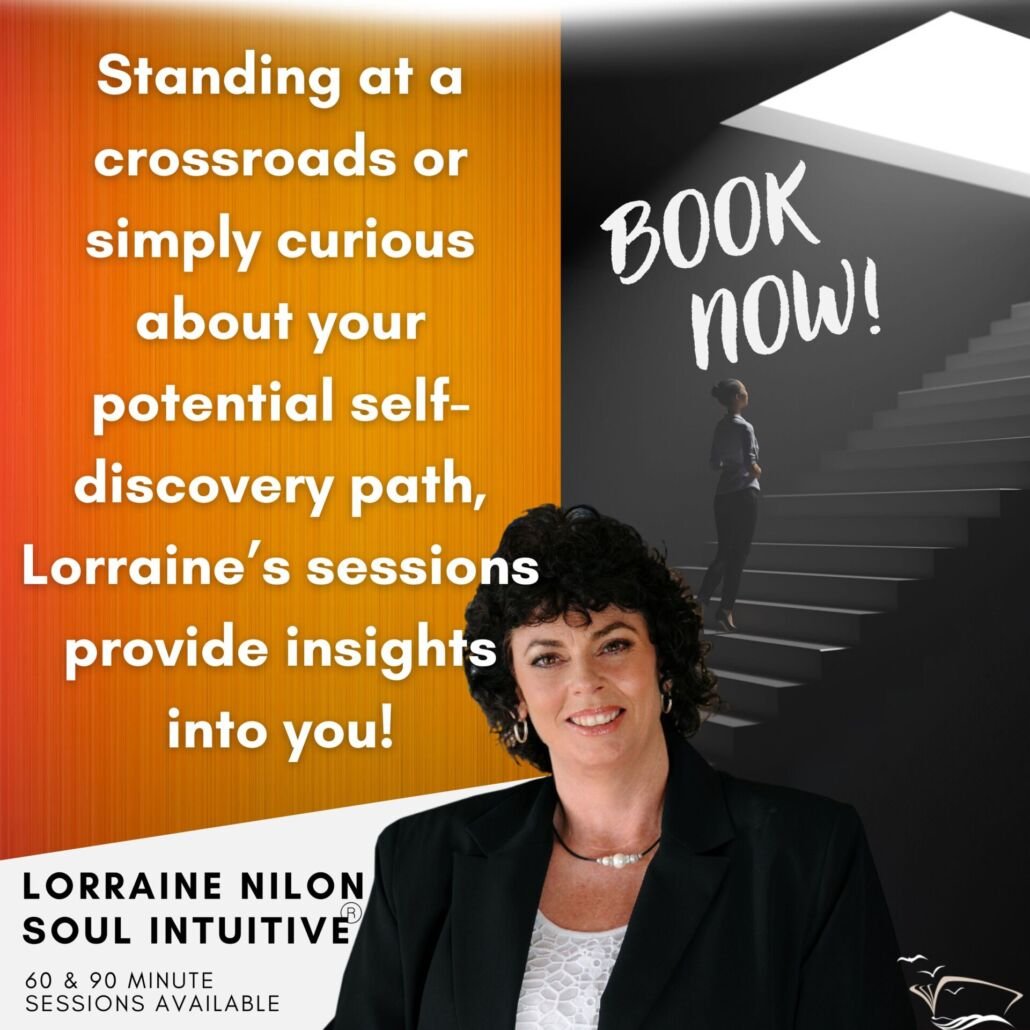Healing After Narcissism, Surviving Narcissism, and How to Be Self-Validating.
10 min read.
Healing after narcissism seems overwhelming, and validating our feelings is a starting point!
Life is a complex journey filled with unexpected twists, challenging relationships, and transformative moments. For those of us who have survived narcissism or had our fair share of life storms, we know the intensity of the emotions we’ve suppressed in the hope that our sacrifice will lead to a harmonious future.
There are not many who, in hindsight, will still defend the action of grin and bear it!
Navigating through life-changing events is hard enough without having to survive another’s narcissism. Many dread the realization that another is treating them so obnoxiously and attempt to disregard the impact narcissism is having on their emotional well-being.
All those who have lived, worked, and even attempted to be friends with a narcissist know once the realization that you’re in a relationship with a narcissist has occurred – there is no dimmer switch.
Narcissists leave their prey grappling with a whirlwind of emotions: we gave grace; they gave us contemptuous criticism. We created excuses; they kept pushing our boundaries until they were non-existent, leaving us bewildered.
When we realize that there is intention behind their obnoxiousness, the crashing weight of regret, humiliation, and sorrow becomes a shame we carry.
When this realization is no longer pushed aside, it is important to validate our own feelings, acknowledge the narcissist’s intent, and seek validation from supportive others.
Support during this time becomes not just relevant but crucial for our emotional well-being. The support should never come with demands; it should be a safe place for them to unravel the reality of healing after narcissism, even if they’re trapped in the relationship.
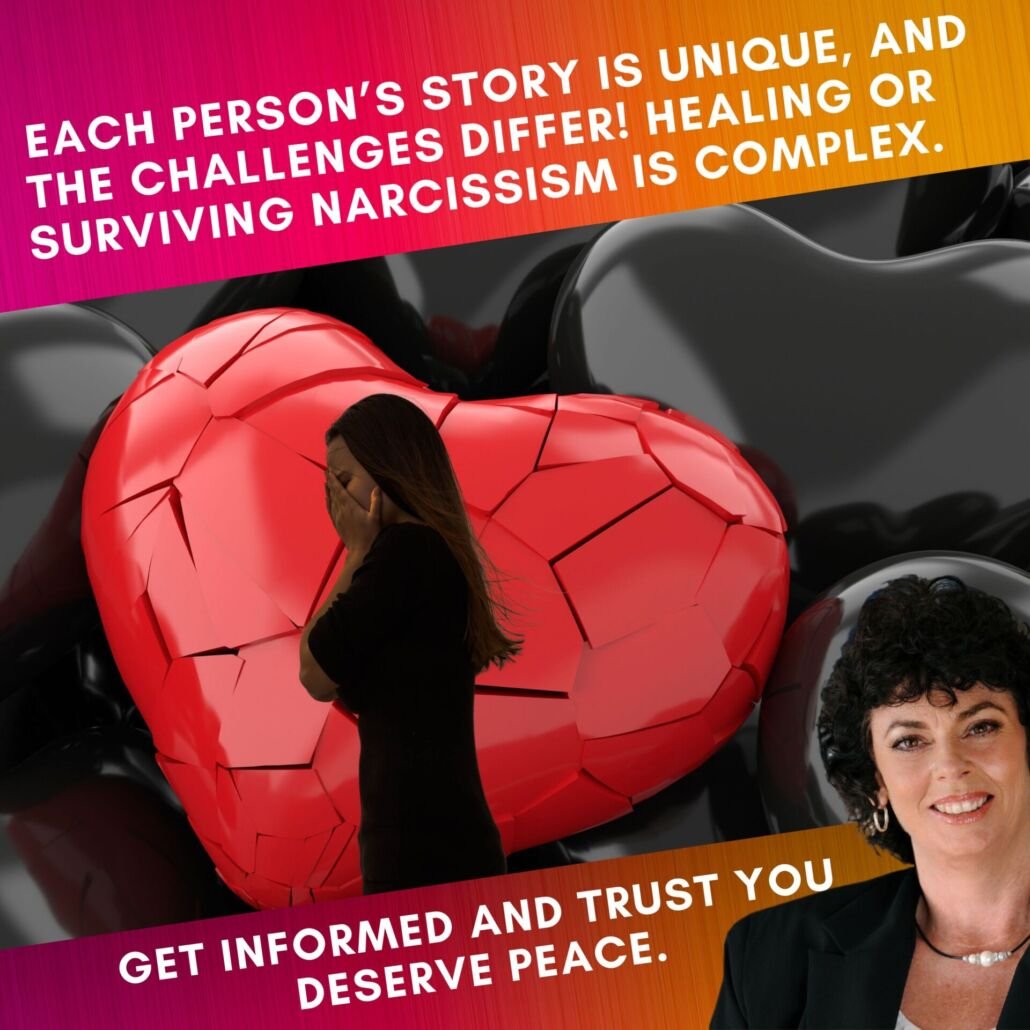
Healing after narcissism requires honest self-reflection and support!
Understanding the Power of Validation:
In the midst of life’s emotional storms and the realization of reality, the simple act of acknowledging and validating our emotions can be a beacon fire. One that reminds us of our worth, steering us in the direction of nurturing and protecting ourselves.
Validating ourselves is like finding a safe harbor in the midst of a tempest, a space where we are allowed to feel and express without judgment.
Validation is not about agreeing with our emotions but recognizing their existence. This enables us to understand they’re an indicator beaconing us to acknowledge how we feel and to be honest with ourselves.
Within all emotional storms, there is a moment that requires us to be honest with ourselves and acknowledge the true impact of what we are experiencing on our personal well-being.
In the storm of realization, confusion will cause us to look for the familiar ports, places to hide from reality. The patterns we often detest but are known will begin, and we must acknowledge the choices we are making. If we want different from ourselves, we must respond differently to our emotional reactions.
We’ll attempt to avoid feeling what we believe proves we deserve to suffer. It is a hidden belief buried under sorrow and disappointment and built on misconceptions. But it can be strong and cloud our ability to discern the truth.
We never deserved to suffer, and when another takes pleasure from the power and control of instigating such pain, they exist on the spectrum of narcissism.
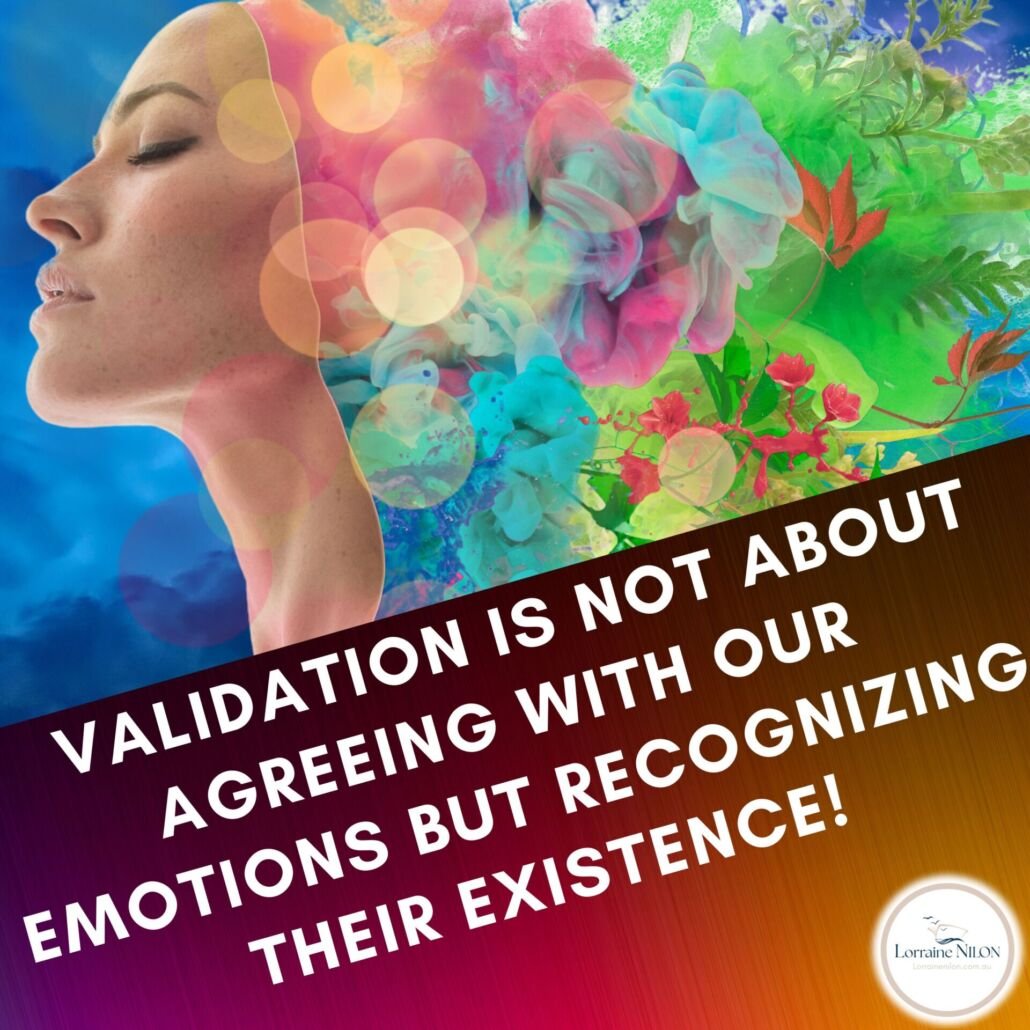
Surviving Narcissism and Gaslighting!
Personal Reflection:
I vividly recall a period in my life when I was faced with the realization that someone close to me was not healthy for me. Every time I’d try to explain my emotions, I was met with disparaging remarks and the gaslight jive choreographed by a champion.
The next day I’d find myself being lectured to, as they reiterated my words as their own. Accusing me of what I’d tried to discuss the day before. It was bizarre that they expected me to ignore the twist of my words. They said them as if they never heard them before!
The frustration was insurmountable because trying to find solutions with someone who only wanted to annihilate my confidence is unachievable.
Self-doubt crept in as they attempted to steer me towards being submissive to their deviant coercion. I doubted my grasp of reality, questioned my motives, and felt guilty for being the source of another’s trauma. Except I wasn’t that was the jive of gaslighting, to make the innocent feel guilty, and to accuse the victim of being the perpetrator!
I was desperately trying to be nice, thoughtful, and compassionate, and it was all used against me!
It was during this time a friend’s simple validation, “I can see you’re going through a tough time, and that’s okay,” became a lifeline. “I can see deception at play, and you’re trying to support them as they take advantage of you!”
That acknowledgment allowed me to embrace the truth of my emotions and take the first steps in stopping my fight against reality and my own awareness.
We try to tell ourselves it’s not that bad; “you’re misreading the situation”, but most of the time we are not. We instinctively know, acknowledging the truth of the other person is going to change the relationship forever, so we attempt to deny reality at our peril.
The validation opens the door to validate myself because not only were they gaslighting me, but I was also gaslighting myself.
This realization enables me to stop and take accountability for myself and not to continue taking full responsibility for another’s behaviour. It was an opportunity to value my freedom to have boundaries.
This acknowledged reality became part of the steps towards healing the deeper wounds that made me susceptible to appeasement for the illusion of peace, respect, and love. An illusion never sustains and once recognized becomes tainted with the ugliness of their narcissistic traits.
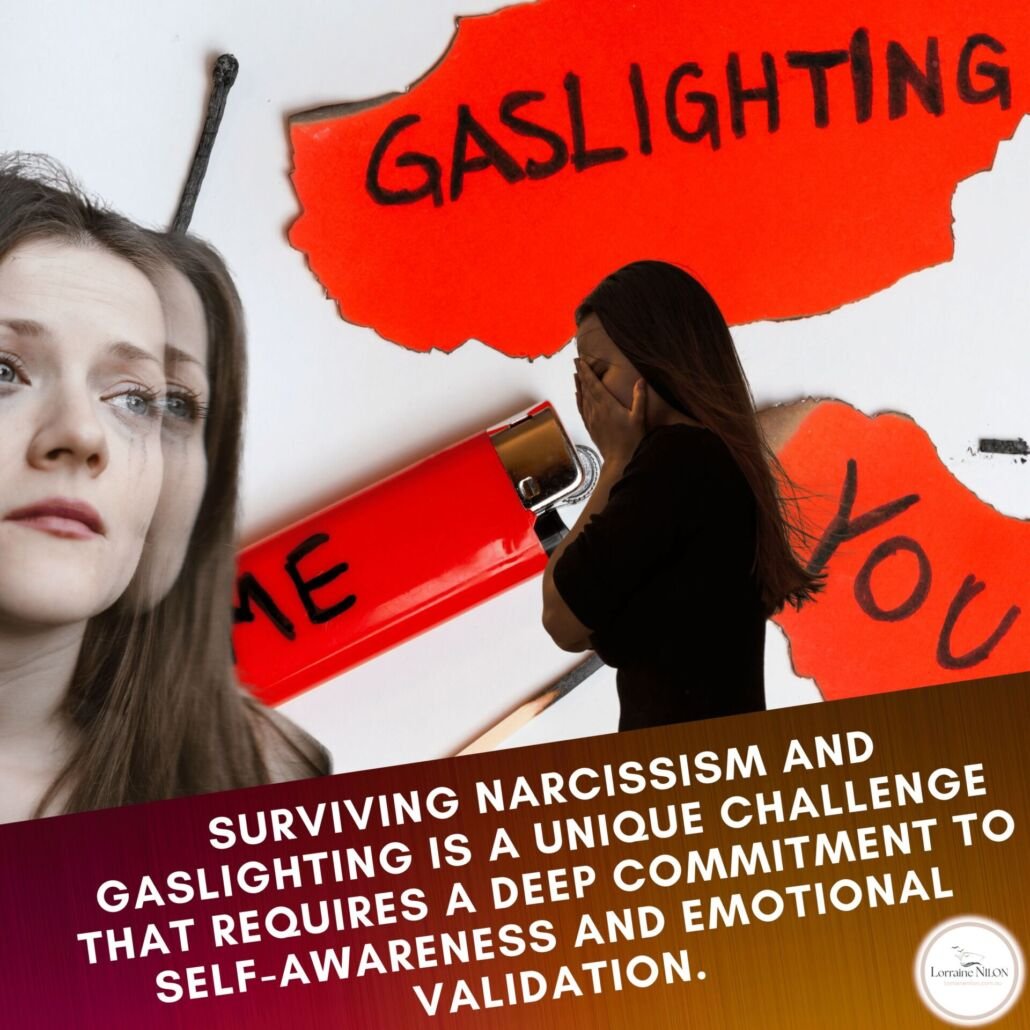
Recovery from gaslighting is possible!
Self-Gaslighting:
Self-gaslighting is subtle yet powerful. We internalize and perpetuate the very manipulative tactics we have experienced from others.
We distort our own perception of reality, downplay valid emotions, and question the legitimacy of our personal experiences and feelings. It’s a form of self-doubt and self-deception that undermines our confidence and destroys our ability to self-trust.
Past traumas, being raised in toxic relationships, constantly feeling rejected, not good enough, or deflected cause us to try and create safety – even if it is just in our mind – and self-gaslighting becomes our normal.
Self-gaslighting is an internal dialogue that invalidates our feelings or experiences. Unravelling the layers of self-gaslighting requires self-awareness, compassion, and a commitment to breaking free from the patterns that contribute to internal dissonance.
Personal Reflection:
Instead of acknowledging the toxic behaviour around me, I attempted to convince myself that maybe I was not as competent as I thought. The constant undermining started to erode self-confidence, and I found myself questioning my worth.
I had invited the narcissist into my life; I thought I could help them overcome their insecurities. “Look at my arrogance!” I began to find reasons why I was the problem.
I didn’t realize this was self-gaslighting or that I was instinctively trying to generate a sense of safety. “Maybe I am too sensitive, am I overreacting, or I always look for drama in my life? What am I doing to cause people close to me to act this way?” When we self-gaslight instead of addressing the individual event, we start the internal dialogue with the “always, people, never” statements. Self-blame and despair become the go-to!
I felt vulnerable and disrespected and instead of acknowledging this. I went to self-blame and believed it was my job to fix it. I unwittingly became a participant in my own self-gaslighting narrative.
Rather than recognizing the external manipulation for what it was, I increased the blaming of myself. I couldn’t find a solution; therefore, I was to blame. “They can’t help themselves; they’re struggling with their emotions, they don’t realize how hurtful they’re being.” I altered my perception of reality to align with the gaslighter’s version.
I started to internalize every word they said and these incidents gradually had me shell-shocked and doubting my own abilities and worth.
My self-perception was changing and I couldn’t see it; doubt replaced confidence. Breaking free from self-gaslighting involves recognizing these thought patterns, challenging them, and seeking external validation.
I need someone to reassure me that I wasn’t to blame. I needed support to regain clarity.
I needed to voice what had occurred not through the filter of self-blame but with a sense of classifying what had happened. Being honest about it enabled me to recognize my reactions to what had occurred instead of being fixated on just the emotions entwined with the reactions.
Being objective is a crucial step in reclaiming your self-worth and dismantling the internalized narratives that perpetuate self-doubt.
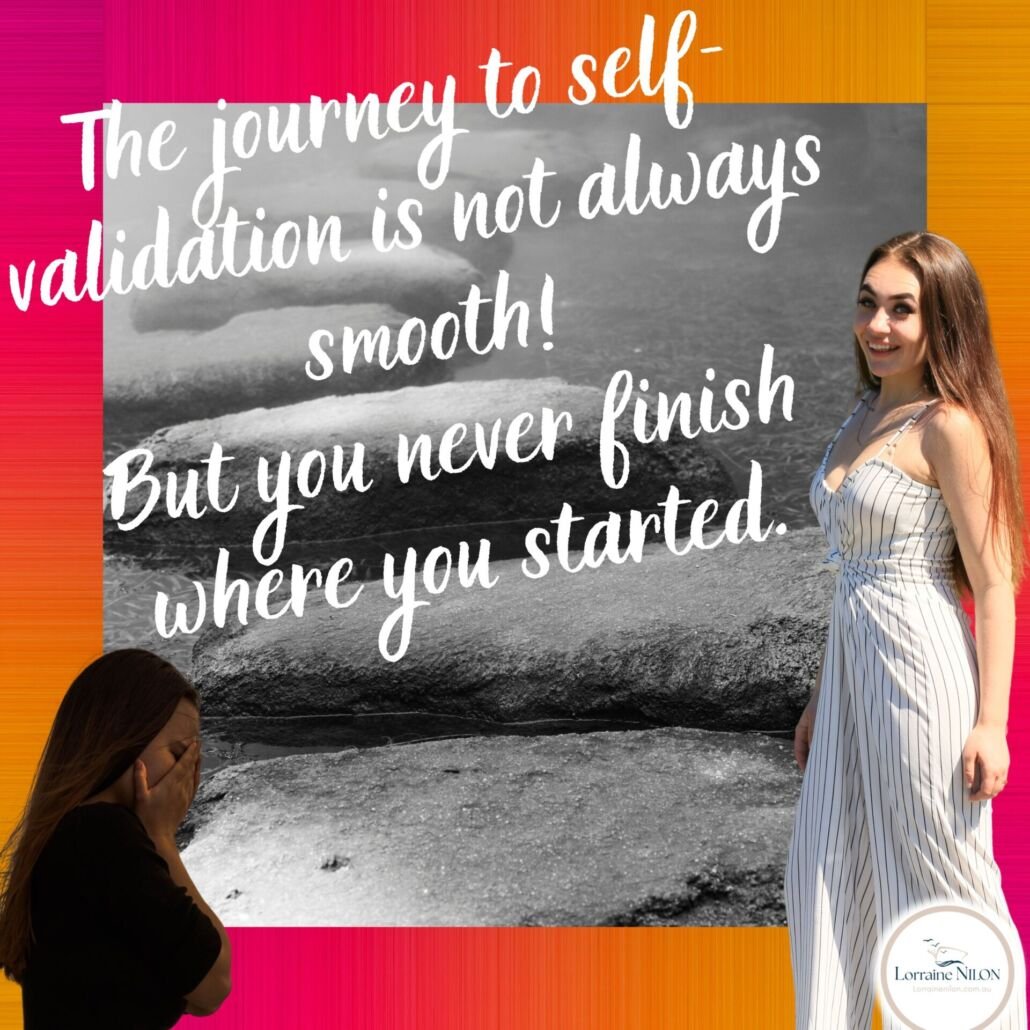
Gaslighting destroys our self-confidence and self-validation repairs it!
The Struggle to Validate:
The journey to self-validation is not always smooth. The struggle lies in overcoming self-imposed judgments, societal expectations, and the fear of appearing vulnerable.
Many of us are conditioned to believe that expressing our emotions is a sign of weakness, leading to a constant battle with our inner selves.
We must first be willing to be honest about our feelings and give them a voice, even if it is just to the one in the mirror.
We struggle when we deny our reality! We prolong suffering when we are unable to accept our feelings are communication from within.
For many, the struggle for validation can become an obsession of wanting the narcissists to validate our observations and feelings. But this is not part of the narcissistic jive! Their validation is a manipulative tool and even if given, it is taken back, generally in the next sentence uttered!
The truth will be ignored, invalidated and refuted with the agenda to mock or manipulate us! Accepting this about the narcissist is difficult but essential; “we can’t get blood out of a stone”, and no one gets the truth in its purity from a narcissist.
Gaslighting and Emotional Manipulation:
In the realm of emotions, gaslighting is a dark force that undermines our sense of self.
Gaslighters manipulate our reality, making us doubt our own emotions and experiences.
Recognizing these tactics is crucial in maintaining emotional well-being. When doubt creeps in – check facts and acknowledge them as undebatable facts. The narcissist reject reality but we must never align with the deception.
Spotting the Signs:
Gaslighting often starts subtly, with phrases like, “You’re overreacting” or “You’re too sensitive.” These seemingly harmless comments can snowball into a web of self-doubt, making it challenging to trust our own feelings.
Recognize them as rude comments not a personal analysis of you! Then identify the motive behind them; what is the narcissist attempting to avoid.
Don’t try to prove to them what you’re observing; that’s an invitation to ride their merry-go-round of deception. But do validate it to yourself; this will enable you to observe the antics with clear vision.
Building Emotional Resilience:
Developing emotional resilience is akin to fortifying ourselves against life’s storms. It involves acknowledging our vulnerabilities, understanding our emotional triggers, and actively working towards self-acceptance. You no longer need their validation because you seek your own.
You’ll feel the strength of your integrity when you begin to validate yourself. In moments of confusion and despair anchor to a fact they disputed but you have clarity about. This will remind you of their willingness to be deceptive and enables you to devalue their words and actions because they don’t see you, they see prey!
Practical Strategies:
Mindfulness Practices: Engaging in mindfulness activities, such as honest self-reflection, meditation, or journaling, allows yourself to observe your emotions without judgment.
Cultivating Supportive Relationships: Surrounding yourself with individuals who validate your feelings and offer support. This will strengthen your emotional resilience.
Pro-tip: make sure you talk about other things – movies, music, or books – you don’t want to become stuck analysing your history; let life move you forward. Debrief when needed but not as a compulsive habit.
Seeking Professional Guidance: Therapeutic interventions provide a structured space for exploring and validating complex emotions. You may need an impartial umpire, so your unresolved emotions don’t take your steering wheel.
Personal Reflection:
During any challenging phase, I turned to the power of self-reflection, and learning how to be honest with yourself is easier said and done. It was through moments of self-reflection that I realized the power of validating my own experiences.
The skill of being self-reflective and the opportunity to have honest conversations – debriefing with someone trustworthy – became pillars of my emotional resilience, helping me weather subsequent storms with newfound strength.
Relationships and Validation:
In the intricate dance of relationships, validation becomes the melody that harmonizes our connections. Whether in friendships, family bonds, or romantic relationships, acknowledging each other’s emotions fosters a sense of security and strengthens the foundation of trust.
The jive of narcissism and gaslighting destroys trust but never allows it to remain the block to self-trust and your ability to dance with another.
The Dance of Validation:
Active Listening: Taking the time to truly listen to our loved ones without judgment creates a space for mutual validation.
Expressing Gratitude: Simple expressions of gratitude for the support and understanding shared during challenging times strengthen the bond between individuals. Value the bond with those you are grateful for!
Validating Differences: Embracing the uniqueness of each person’s emotional experience. Acceptance of our uniqueness and never compare your life with another.
Surviving Narcissism, Gaslighting, and Validating Our Awareness, Feelings, and Worth:
Surviving narcissism and gaslighting is a unique challenge that requires a deep commitment to self-awareness and emotional validation.
Narcissists often thrive on invalidating the emotions and worth of those around them, leaving a trail of confusion and self-doubt.
Healing after narcissism takes time and effort, but you are worth it!
Empowering Ourselves:
Recognizing Narcissistic Behaviour: Understanding the traits of narcissism is the first step toward protecting our emotional well-being.
Constant criticism, projection of insecurities, and a lack of empathy are telltale signs.
Validating Our Feelings
Self-Awareness: Trusting our gut feelings and acknowledging the impact of narcissistic behaviour on our emotions is crucial.
Self-awareness becomes our shield against manipulation.
Affirming Our Worth: In the face of constant invalidation, affirming our self-worth becomes an act of defiance. Seeking validation from within and surrounding ourselves with a support system that understands our journey is paramount.
Personal Reflection:
Having encountered narcissistic behaviour and gaslighting in close relationships, I learned the hard way that self-validation is a powerful tool against manipulation.
Recognizing the signs allowed me to protect my emotional well-being and disengage from toxic relationships.
Affirming my worth became a daily practice, reinforcing the understanding that my emotions and experiences are valid.
Most people who haven’t experienced long-term narcissism think the answers to the challenges are easy. Leave them, get away from them, get a new job, but that’s not always the case; some are family members, part of our financial security, believed inescapable.
Each person’s story is unique, and the challenges may differ, but the reality is healing or surviving narcissism is complex. Get informed and trust you deserve peace.
In conclusion the tapestry of life, weave a story of our feelings and emotions. Resilience, growth, and self-discovery are born through us being self-reflective.
Validating our own feelings and extending this validation to others forms the foundation upon which we build emotional well-being.
As we navigate life’s storms, let us remember that embracing our emotions and seeking validation from supportive people or those who have experienced similar is not a sign of weakness but a testament to our strength and willingness to nurture our authenticity.
 Free 12-Day Quote Contemplation Course.
Free 12-Day Quote Contemplation Course. 
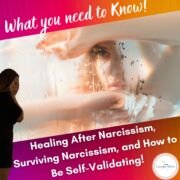 Lorraine Nilon
Lorraine Nilon